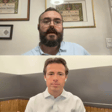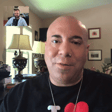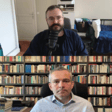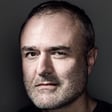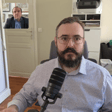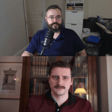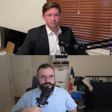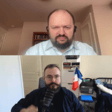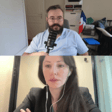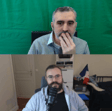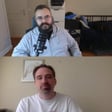Become a Creator today!Start creating today - Share your story with the world!
Start for free
00:00:00
00:00:01

Ep 18 - Rod Dreher - "Living in Wonder: Finding Mystery and Meaning in a Secular Age"
On this episode of the Sphere Podcast, Pascal-Emmanuel Gobry, Publisher of Sphere Media, interviews the great conservative writer Rod Dreher, to talk about his latest book, "Living in Wonder: Finding Mystery and Meaning in a Secular Age."
Subscribe to the PolicySphere Morning Briefing: https://policysphere.com/subscribe
Subscribe to Rod's Substack: https://roddreher.substack.com/
Follow Rod on X: https://x.com/roddreher
Subscribe to the Sphere Podcast on Apple Podcasts: https://podcasts.apple.com/us/podcast/sphere-podcast/id1780831168
Subscribe to the Sphere Podcast on Spotify: https://open.spotify.com/show/48eWEcxSYDyrgjC3lO0EJZ
Subscribe to the Sphere Podcast on YouTube: https://www.youtube.com/channel/UCB2gs2TBXeP7vyn9QUaaxjQ
Transcript
Introduction of Podcast and Guest
00:00:01
Pascal-Emmanuel Gobry
Hello, everyone, and welcome to the Low Production Value Sphere podcast, which is shot from my terrorist hideout in northern Nigeria. And i have a guest with me who apparently has also been kidnapped by ISIS, judging by his background. It's my very good friend, Rod Dreher. How are you, Rod?
00:00:25
Rod Dreher
I'm doing well, Peg. Thanks for having me on. and In fact, I am hiding out upstairs in my Budapest lair because the cleaning lady is downstairs.
00:00:37
Pascal-Emmanuel Gobry
ah that um That's actually acceptable.
Discussion on Rod's New Book and Meme Culture
00:00:42
Pascal-Emmanuel Gobry
um So basically, ah you have a new book coming out. I mean, there's a million things we could talk about.
00:00:50
Pascal-Emmanuel Gobry
I've read your stuff since, ah God, I don't know when, maybe 15 years Yeah. at least
00:00:56
Rod Dreher
Wow.
00:00:57
Pascal-Emmanuel Gobry
um
00:00:58
Rod Dreher
I'm old, man. I'm really old.
00:01:02
Pascal-Emmanuel Gobry
we're both We're both getting old. ah So we could talk about a million things, but let's talk about your book. You always come out with very interesting books, ah very books that have you unusual angles, books that become memes. you know and like ah how how many How many people who talk about the X option on Twitter, the whatever, know that it actually comes from a book by Rod Rear? I don't know.
00:01:29
Pascal-Emmanuel Gobry
So your
Max Weber's Thesis on Disenchantment
00:01:30
Pascal-Emmanuel Gobry
latest book is called Living in Wonder. So tell us what the book is and what it's about.
00:01:36
Rod Dreher
Well, the book is about Christian re-enchantment, about re-enchantment generally, but specifically about Christian re-enchantment. What do I mean by that? Well, everybody knows the Max Faber thesis that in the modern world has become...
00:01:51
Pascal-Emmanuel Gobry
Not everybody knows, actually.
00:01:52
Rod Dreher
Okay. All right. Well, let's tell them. ah Max Weber was a great sociologist, early 20th century, late 19th, and who said that the modern world has become disenchanted.
00:02:04
Rod Dreher
What he meant by that was that people no longer are conscious in ways they were in the past of the presence of spirit everywhere. And, you know, we've become much more materialistic, um scientific, technological, that sort of thing.
00:02:19
Rod Dreher
And he came at it from a sociological perspective. and And I think he was generally right. Although I don't, I, it's a good question about whether the world can ever be fully disenchanted. In any case, I think that is generally true. i mean, as you well know, because we've talked about it for over the years, um,
00:02:37
Rod Dreher
I'm a big fan of Michel Welbeck, you're the French novelist, and I think he is a a diagnostician of secularism, of a world without God and without spirit, though he's not a religious person himself.
Rod's Trilogy and Christian Resilience
00:02:51
Rod Dreher
And i I didn't set out to write a trilogy with the Benedict Option 2017, Live Not By Lies 2020, and now Living in Wonder, but that's kind of how it's shaken out, because the problem that concerns me most of all intellectually is what does it mean to be a Christian in a post-Christian civilization, our own?
00:03:10
Rod Dreher
And Benedict Option was about the what I think is the imperative for Christians to form smaller communities, of faith not to withdraw from the world and head for the hills. We can't do that. That's just not even possible today.
00:03:25
Rod Dreher
But to make ourselves go deeper in the faith and be more resilient so that when we are in face the post-Christian world, we can be faithful. Live Not By Lies came out at the height of COVID and after the summer of George Floyd.
00:03:39
Rod Dreher
And it's about the the warnings that people who live through Christians and others, who but mostly Christians, who live through communism, Soviet communism, the warnings they had for us in the West about the totalitarian nature of wokeness and managerial liberalism.
Revitalizing Christian Faith through Re-enchantment
00:03:57
Rod Dreher
And in fact, that's about to be a documentary film that was coming out April 1st from Angel Studios. We went into the former Eastern Bloc and talked to some of these Christians.
00:04:08
Rod Dreher
um And so what that book was in terms of my my own interest was about a particular nature, the particular nature of the kind of totalitarianism we were living through. Now, this final book is about what I it's at the heart of the project, which is to say, i don't don't believe that the Christian faith will recover until and unless ah we revitalize it with re-enchantment, by which I mean,
00:04:35
Rod Dreher
we find ways to to make the faith live, not just as a set of ideas or a set of social practices, but as as a way of connecting with God. i mean, Marshall McLuhan, the great ah media theorist, was a daily mass-going Catholic.
00:04:54
Rod Dreher
And he once said that people make, in in the modern times, think that religion is concept, not percept. By percept, he meant the things that we take in with our with our senses, and ah the sensory information that comes into our brains.
Literature and Personal Experiences as Re-enchantment
00:05:10
Rod Dreher
Maybe the right hemisphere gets sent over to the left for analysis. and um But we get stuck in the left brain and religion becomes a set of propositions.
00:05:20
Rod Dreher
um Well, I say that it when we start McLuhan said that if religion becomes concept and we lose the perceptive aspect of it, then the faith will die. He said that everybody he knows who lost their faith did so first by ceasing to pray.
00:05:37
Rod Dreher
And that's the main perceptive way. So that sounds very, very um ah abstract, but
00:05:42
Pascal-Emmanuel Gobry
No, that's fascinating, actually.
00:05:45
Rod Dreher
Well, I'll tell you that there's a French aspect here, too. ah The genesis of the book, I think, came from when I read, yeah i bleo when I read Welbeck's submission, the novel he's probably best known for in America, in which, you know, it's it's about setting a France in the near future.
00:05:50
Pascal-Emmanuel Gobry
a mean we
00:06:04
Rod Dreher
France is about to go Islamist. And the main character, Francois, he's this dissolute Sorbonne professor who is trying to decide whether or not he should conform to the coming Islamist order and you know secure his job and maybe get some ah extra wives.
00:06:22
Rod Dreher
Or if maybe there's ah maybe he can recover his Christian past. So in the film, i'm sorry, in the book, he goes down to Rocamadour, the ah medieval pilgrimage site for French Catholics.
00:06:34
Rod Dreher
He goes in there looking for re-enchantment. He hears them the worshippers singing Taizé chant, and he starts to have a luminous experience. He starts to feel like maybe God is here.
00:06:47
Rod Dreher
Then he catches himself and says, na no, no, this must be something I ate. He goes out, goes back to Paris, converts does this.
00:06:53
Pascal-Emmanuel Gobry
This is very Welbeck. I haven't read Submission, by the way.
00:06:56
Rod Dreher
You haven't, well, I've ruined it for you now, but it's been out for 10 years, so...
00:06:57
Pascal-Emmanuel Gobry
ah
00:07:00
Pascal-Emmanuel Gobry
Well, I mean, I i know the plot. like if Real literature novels are not about the plot. I've read other Welbecks, but I haven't read that one. ah buts very well But Welbeck twist.
00:07:07
Rod Dreher
OK, so but but he makes this decision to refuse this numinous experience and goes back to Paris and makes a cynical conversion to Islam. I wrote this book in part for people like Francois was standing at the threshold of faith in the church.
00:07:23
Rod Dreher
He senses he has an experience of wonder, but he lacks the courage to act on it.
Welbeck's Speech and Christian Beliefs
00:07:30
Rod Dreher
I wrote Living in Wonder in part for men and women like him who sense that there must be something beyond the material world, but they lack the courage to act on that.
00:07:41
Pascal-Emmanuel Gobry
ah That's great. By the way, about Welbeck, so I have no non-public information. I don't know him. you know People assume that French people all know each other, and that's actually mostly true.
00:07:52
Pascal-Emmanuel Gobry
Yeah. because the the the French quote unquote elite is a very small world, but I don't know Welbeck, ah but there's something I noticed. And so this is public, I'm going to talk about it, but nobody else seems to have noticed this. So it was a couple, a few years ago, either just before during the pandemic.
00:08:13
Pascal-Emmanuel Gobry
um And he was ah invited to receive an award in Belgium. I'm forgetting the concept. I'm just bringing it up because you mentioned him. um And he gives a speech.
00:08:23
Rod Dreher
Thank you.
00:08:25
Pascal-Emmanuel Gobry
And, you know, he's kind of a recluse. So it's kind of weird that he's, you know, coming to accept this award in Belgium. ah Nobody in France cares about Belgium. um And his speech is about the status the status of Christianity in Europe and like the future of Christianity in Europe.
00:08:42
Pascal-Emmanuel Gobry
and he gives the speech and it's it's interesting, blah, blah, blah. And throughout the speech, when he talks about Christians, he uses the third person. He says, Christians have these problems, blah, blah. This is what happened to Christians, blah, blah, blah. 90% of the speech and then the last 10% still speaking about Christians, he switches to the second person. He says, we, when speaking about Christians in Europe.
00:09:08
Pascal-Emmanuel Gobry
And obviously that's not a coincidence.
00:09:11
Rod Dreher
Right.
00:09:12
Pascal-Emmanuel Gobry
ah he's a He's a talented writer. um And... I mean, they publish like nobody seems to have noticed this. like They published the text of the speech and none of the coverage.
00:09:25
Rod Dreher
Interesting.
00:09:26
Pascal-Emmanuel Gobry
Apparently people didn't read it or didn't pay attention or whatever. I'm not aware that he made any further statement saying, I'm a Christian.
00:09:37
Pascal-Emmanuel Gobry
um And again, he's a he's a pretty recluse guy. He doesn't like talking to the media. He doesn't like seeing people he doesn't already know. um So who knows, but i thought I thought that was fascinating and I thought the fact that nobody picked up on that was also fascinating, but about something else.
00:09:49
Rod Dreher
but
00:09:57
Rod Dreher
Yeah, well, ah he's written before about how he's a Kantian. You know, he believes
Transcendence and Secularism in Civilization
00:10:02
Rod Dreher
with Auguste Comte that you cannot have a society without some religious basis, without there being some generally shared belief that society is grounded in transcendence.
00:10:15
Rod Dreher
Now, Philip Reif, the American sociologist and cultural critic, was an unbelieving Jew, but he believed the same thing. And he talks in his cultural theory, Reif talks about his theory of worlds. The first world in Reif's scheme was the ancient world of ancient paganism. The second world was monotheism.
00:10:38
Rod Dreher
The third world, which is what we live in now in Reif's model, is a world that no longer makes reference to transcendence, to a transcendent source of morality.
00:10:50
Rod Dreher
It has become instead ah a world dominated by the therapeutic mode. You've heard of his his great 1966 book, The Triumph of the Therapeutic.
00:11:01
Rod Dreher
What he meant by that is in and in the 20th century, and course now,
00:11:01
Pascal-Emmanuel Gobry
Right.
00:11:06
Rod Dreher
we in the West have gone, we've ceased to believe in overarching narratives, the biblical narrative that calls us out of ourselves and but and which gives us
Cultural Crisis in Europe and Morality
00:11:16
Rod Dreher
a moral framework by which to judge ourselves. And instead, we've embraced a mode of existence, which is um always shifting, but oh it's a way of living that makes ah at places well-being at the top of our lives.
00:11:31
Rod Dreher
of our scale. And we seek rather rather than to seek to live by some sense of prophetic um ah morality and and ah God or whatever.
00:11:41
Rod Dreher
We just want to get through the day that whatever works to allay our anxieties is sufficient. Reeve said you cannot you can't have a civilization that way. He said that we We don't know of any civilization in history that has ah been able to sustain itself without transcendence.
00:12:02
Rod Dreher
Now, this matters a lot to me, not only as an American, but especially as an American living in Europe. I'm in Hungary, in Budapest. And, you know, Viktor Orban, the controversial leader of Hungary,
00:12:13
Rod Dreher
has said openly that Europe will not survive unless it recovers its Christian faith. And I mean, he's doing what he can as a politician to make that happen, but there's not a lot you can do as a politician.
00:12:27
Rod Dreher
um But, and and he said too, and this really impressed me when I read the speech he gave, he said, people look to me, a politician for meaning.
00:12:38
Rod Dreher
I can't give them meaning. I can give them things by which I take it that he means like subsidies or passing laws to make it possible for churches, religious schools, families to thrive.
00:12:49
Rod Dreher
He said that if those institutions, again, churches, schools, families, whatever, the ones that do provide meaning or access to meaning, if they don't step into the space that politicians provide for them to thrive, then all the work we do as politicians, it's in vain.
00:13:07
Rod Dreher
This is an existential question for Europe right now and lesser for America, but also for America. ah We see among us here in Europe, the power of Islam and and you can't fight something with nothing.
00:13:22
Rod Dreher
I don't know what... Absent Christianity, I don't know what Europe uses to resist the power of Islam. I mean, what do you think about this? I think you probably had some thoughts about it.
Existentialism and the Meaning of Life without God
00:13:37
Pascal-Emmanuel Gobry
ah ah I mean, i you know i'm I'm a European Christian. I'm a French Catholic. um obviously I obviously completely agree with that.
00:13:49
Pascal-Emmanuel Gobry
um I mean, it's it's sort of... i don't know how to put it, but...
00:14:02
Pascal-Emmanuel Gobry
There's a kind of blindness. So the point, the the observation you make is sort of obvious. it's It's obvious at the historical, sociological level, like every great civilization has believed in some sort of absolute that it sort of tries to reach for, and this is what motivates them to you know build cathedrals and whatever.
00:14:27
Pascal-Emmanuel Gobry
you know whatever do all of the great things that great civilizations do. And it's also an obvious observation at the individual level, which is that we all know that, you know, we're going to die.
00:14:41
Pascal-Emmanuel Gobry
And if... if all we are are you know atoms and cells and all that then there's literally no point to anything else like i mean this is you know people mock the the sort of post-war french philosophers for talking about suicide all the time and especially camus but like they're just being logical they're just they're just following the the logical chain ah all the way through when Camus says, you know, if God doesn't exist, then the single important question is the question of suicide.
00:15:16
Rod Dreher
Mm-hmm.
00:15:17
Pascal-Emmanuel Gobry
Right, which is if if there's no transcendent meaning and order, then, you know, what's the point of life? And if there's no point to life, then why not just end it?
Genuine Religious Conversion
00:15:28
Pascal-Emmanuel Gobry
um and And of course, you know, Camus gives his sort of the existential answer, which in my view is the sort of most convincing version of this. um And obviously people can judge how convincing it is. And of course, in his personal life,
00:15:45
Pascal-Emmanuel Gobry
ah This is something that people don't talk about, but Camus was a very sort of God-haunted person. ah He was sort of like always on the threshold of converting. He had this ah priest who was a close friend of his who he sort of like kept, you know, talking to about faith. And, you know, Camus died tragically in a car accident. and And that priest said, you know, that he was convinced that he would eventually have converted if he lived.
00:16:10
Rod Dreher
Thank
00:16:13
Pascal-Emmanuel Gobry
um So, you know
00:16:17
Pascal-Emmanuel Gobry
But we're, and so these are sort of obvious things and and yet there's a lot of people who have this sort of blindness to it. Like you they sort of look at you, you sort of blankly and I'm talking about the like people who are again I hate I mean it's not that I hate this word it's overused but people who are in the leads people who run our societies like you know
00:16:44
Rod Dreher
Right, right.
00:16:48
Pascal-Emmanuel Gobry
surely you don't want France to turn into a Sharia state. Oh, no, no, no, no. no And in private, they all acknowledge how bad the situation it with Islam and that there are enclaves that are basically run according to Sharia law and that they're growing and that, you know, if if nothing is done, then that's where we're going to end up.
00:16:59
Rod Dreher
Right.
00:17:10
Pascal-Emmanuel Gobry
ah Not on the accelerated timeline of Welbeck's novel, but, you know,
00:17:15
Rod Dreher
Mm-hmm.
00:17:16
Pascal-Emmanuel Gobry
ah And then you're like, okay, well, then that means that you have to fight back Islam in the name of something. And so, well, sometimes they say, oh, you know, it's in the name of liberal values.
00:17:29
Pascal-Emmanuel Gobry
It's like, oh you know.
00:17:31
Rod Dreher
Yeah, where has that gotten us? And, you know, we've taken or I've introduced a political turn to the discussion, but Living in Wonder is not a political book.
00:17:34
Pascal-Emmanuel Gobry
Yes.
00:17:40
Rod Dreher
And I, you I'm excited when I hear about people like Ayaan Hirsi Ali and others who recognize that all the good things or most of the good things we have in the West come out of Christianity and who talk about the need for the culture and the civilization to become re-Christianized.
00:17:41
Pascal-Emmanuel Gobry
yes
00:18:00
Rod Dreher
That's all true. But ah a conversion that is merely instrumental, like we convert because it's good for our civilization, that doesn't really work.
00:18:11
Rod Dreher
What I'm interested in in this book is the real conversion, is is people making a sincere connection with the living
Rod's Personal Journey to Faith
00:18:20
Rod Dreher
God. And, you know, for me in my own life, I was raised ah in the 1970s in a small town Louisiana.
00:18:26
Rod Dreher
Our family went to a Methodist church on Easter and Christmas. like My Christianity was merely cultural. And by the time I got to be a teenager, I threw it away. It was boring to me. I thought it was basically, you know, the white middle class at prayer.
00:18:41
Rod Dreher
um But then when I was 17 years old, you know this story well, my mom won a trip to Europe at a church contest, didn't want to go, sent me because I wanted to get to Paris to go to the museums and see where Hemingway lived and all that.
00:18:55
Rod Dreher
I was the only young person on a bus full of elderly American tourists. We stopped an hour outside the city to go look at an old church. I almost didn't get off the bus because who wants to go see another old church?
00:19:06
Rod Dreher
But I did, and it was the cathedral at Chartres. I walked into that medieval cathedral not knowing anything about it, you know growing up in late 20th century small town America, and there was God.
00:19:19
Rod Dreher
I didn't have a religious experience per se, but I remember standing in the labyrinth there looking at up at the at the vaults and the stained glass and the rose window, and I was overwhelmed by the presence of God. I somehow knew that God was here.
00:19:35
Rod Dreher
And that he wanted to know me. And I wanted to know the God that had inspired men 800 years or so ago to raise such a temple to his glory. I didn't walk out of there as a Christian, but I walked out of there on a search.
00:19:50
Rod Dreher
And it was a search that ended eight or nine years later with me becoming a Catholic. Now, um I think that experience is open to everybody. Not everybody who walks into the cathedral at Chartres converts, obviously, or we would be living in a very different world.
00:20:05
Rod Dreher
But for whatever reason, I was open to it. And that experience of radical beauty bypassed all of my my feeble teenage agnostic ah objections to the faith and pierced my heart and my my mind eventually began to pry open to the arguments for the faith.
Beauty as Pre-argument for God
00:20:25
Rod Dreher
Many years later, I read that Pope Benedict XVI, as Cardinal Ratzinger, I believe he was when he said this, he said that the best apologetic arguments for the Christian faith today are not the rational ones, not propositional.
00:20:39
Rod Dreher
but rather the art that comes out of the church and the saints. What did he mean by that? He meant that beauty is the thing that will save souls. When you are confronted by radical beauty, like the cathedral at Chatra, or radical moral beauty in the life of a saint,
00:20:59
Rod Dreher
you you can't deny it. I mean, Solzhenitsyn said that beauty cannot be denied. it It is real. It is something we perceive. Now, it is not an argument for God necessarily, but it is a pre-argument for God.
00:21:16
Rod Dreher
If I had not seen, had that experience in the Schott Cathedral and years later, the thing that finally tipped me over into becoming a Catholic, was meeting a holy man, a holy elderly priest who was just radiant, luminous with sanctity.
00:21:32
Rod Dreher
And I realized i I've seen it again. I've seen something else here. And I can't, i my all my objections have to go away. i know what the right thing to do is. And so I converted.
00:21:43
Rod Dreher
In both cases, I saw Christianity made incarnate. I saw it in a way that I was able to perceive it and perceive religious truth in ways that had been hidden to my logical mind.
00:21:55
Rod Dreher
Now, I ah i like ah can't convince someone that, oh, yeah, because Rod Dreher felt God at Chatra and then in the presence of Monsignor Carlos Sanchez, therefore you should become a Christian.
00:22:07
Rod Dreher
But what I try to do with this book is is help people help the reader understand that you that God really is everywhere present and fills all things as the Orthodox say in our prayers.
00:22:19
Rod Dreher
and And they too can find God, but they have to learn how to see for God. There's a quote I use in the opening chapter. a professor at Harvard was talking about education.
00:22:32
Rod Dreher
She said, true education is not imparting information from teacher to student. True education is teaching the students how to be staring at the right corner of the night sky when a comet blazes past.
00:22:45
Rod Dreher
Well, that's my idea of enchantment,
Hartmut Rosa's Concept of Resonance
00:22:47
Rod Dreher
too. i don't i don't offer a formula for re-enchantment. What I try to do, though, is to help the readers be staring at the right corner of the night sky when signs and wonders pointing to the living God blaze past.
00:23:01
Pascal-Emmanuel Gobry
Well, it wouldn't be enchantment if there was a formula to it but by definition, right?
00:23:04
Rod Dreher
Right. Right. Right.
00:23:06
Pascal-Emmanuel Gobry
um
00:23:06
Rod Dreher
No, no, that's a really good point. You know, I i talk in the book about this German sociologist Hartmut Rosa. I don't know if he's a religious believer, but he has this theory of what he calls resonance.
00:23:18
Rod Dreher
And it's a pretty good analogy for enchantment. He says that when we are at home in the world, we feel some mysterious sense of resonance with the world outside our head. We feel some connection to it.
00:23:30
Rod Dreher
Now, but we we make that go away when we try to control the world around us. Like, come you know, you may fall in love with a woman and and there's something mysterious there that that causes her to enchant you.
00:23:45
Rod Dreher
But if you turned her into effectively a slave or you controlled everything about her, she would lose her enchantment. um And this is something that the the English 19th century Romantic poet William Wordsworth said in a beautiful phrase, we murder to dissect, meaning to try to dissect dissect something to understand how it works, you have to kill it.
00:24:09
Rod Dreher
And that's what I think too many of us do with religion. We try so hard to parse to to put religion under the microscope and try to understand it theologically. There's nothing wrong with intellectual inquiry about religion, but it's not knowing about God is not the same thing as knowing God.
The Argument from Beauty and Secular Challenges
00:24:29
Pascal-Emmanuel Gobry
Uh, so there's, there's one thing you mentioned, which was, uh, on my notes for this interview, uh, which I, I wanted to get your take on, which is beauty and beauty as evidence for God, uh, last week or something like that.
00:24:45
Pascal-Emmanuel Gobry
I interviewed our friend, uh, rust outfit, who has a book out on a similar theme to use to yours, although with a different angle.
00:24:54
Rod Dreher
Mm-hmm.
00:24:54
Pascal-Emmanuel Gobry
Um, And, you know, i I wanted to ask him this, but we didn't have time. um There's no argument for beauty in his book. There is in yours.
00:25:06
Pascal-Emmanuel Gobry
And, you know, I remember all of the new atheist controversies and so on and so forth. The argument from beauty is, in my view, one of the most compelling, A, emotionally or personally, and B, sort of metaphysically, um because you know beauty is a transcendental and blah, blah, blah. um every Every beautiful thing partakes of beauty with a capital B, and if there exists beauty with a capital B, then there exists a sort of transcendent reality, and that reality is God.
00:25:41
Pascal-Emmanuel Gobry
ah And yet it's the hardest to put into words ah and especially to explain to a sort of contemporary secular audience. And this is something that I have struggled with myself.
00:25:52
Pascal-Emmanuel Gobry
Like I've, you know, I've stared at a blank page. Yeah.
00:25:57
Rod Dreher
Yeah, yeah.
00:25:59
Pascal-Emmanuel Gobry
with that with the headline like, you know, God and beauty or or whatever, or beauty as evidence for the existence of God or whatever. And sort of like, how do I write this? How do I write this in a way that's compelling? How do I write this in a way that that's the demonstration and not just, you know, oh, look at this beautiful sunset.
00:26:18
Pascal-Emmanuel Gobry
um so how So I know beauty is one the big themes in your book. I read that on the internet. ah ah No, but seriously, so how do you approach it?
Dante's Divine Comedy and Beauty Leading to God
00:26:31
Pascal-Emmanuel Gobry
How do you explain it?
00:26:33
Pascal-Emmanuel Gobry
I'm fascinated by that.
00:26:33
Rod Dreher
Well, yeah, yeah. it's well It's a complex thing. And some people have told me, readers of the book, that the beauty chapter was worth the price of the book. And I'm i'm glad of that. Well, we can go into Dante, for example, into the Divine Comedy.
00:26:49
Rod Dreher
Dante was drawn, the the character Dante in the poem, who goes through hell, up the mountain of Purgasorian, through paradise of the throne of God, he's drawn along by beauty, by the beauty at first of Beatrice, you know, his his love.
00:27:05
Rod Dreher
um And what we see from that is that beauty draws on our erotic desire, on our eros, on our desire to possess it, desire to participate in whatever that that mysterious quality beauty has.
00:27:21
Pascal-Emmanuel Gobry
And just just to be clear, eros in sort of philosophical language doesn't just mean like erotic or sexual.
00:27:21
Rod Dreher
And that
00:27:28
Rod Dreher
Sex, right. Yeah, yeah. that's Thank you for that. um No, it is ah it is the form of, it means desire philosophically. When Pope Benedict wrote about eros and eros as a way to God, this is what he was talking about, that when we allow ourselves to be drawn by desire for beauty, eventually by analogy, you if you do it right, you are drawn ultimately to God, who is the source for all beauty.
00:27:53
Rod Dreher
And this is in the Divine Comedy, this is what the pilgrim Dante learns. You know, Beatrice tells them when they finally meet at the summit of the mountain of purgatory at the end of the second book, um she tells them the mistake you made, Dante, in life was placing my beauty as your ultimate end.
00:28:12
Rod Dreher
You know, in fact, God shined through me. You should have seen my beauty as just sort of an icon that through which the glory of God shone and and pursued God.
00:28:24
Rod Dreher
And then you would have had all the other things. Now, i'm simplifying it somewhat. But, ah you know, i as you know, I'm an Eastern Orthodox Christian.
Orthodox Spirituality and Iconographic Worldview
00:28:31
Rod Dreher
I converted 2006 after i lost my Catholic faith.
00:28:36
Rod Dreher
ah the And I've really come to appreciate in the in Orthodox spirituality, we we see icons not as mere objects, but as windows into the transcendent.
00:28:48
Rod Dreher
And we don't have to get deep into that theology here, but the the Orthodox mind, the entire world is iconographic. that I mentioned before that line, we pray in the morning to be addressed God who is everywhere present and fills all things.
00:29:04
Rod Dreher
It's not to say that the trees are God, the river Sen is God, but rather somehow the glory of God comes through that. And this, by the way, is also in Dante. You know, the the glory of God shines in greater and lesser ways through the material world.
00:29:18
Rod Dreher
This is sacramentality, the principle of sacramentality. So um I think the Catholic mind and the Orthodox mind, the sacramental mind, ah understands intuitively that beauty is ah manifestation of God. And it as we purify our minds, purify our souls, um we can learn to appreciate it more and more.
Solzhenitsyn's Conversion and Non-aesthetic Beauty
00:29:43
Rod Dreher
I think of Solzhenitsyn in the Gulag. You know, and by the way, i I should say when I mean beauty, I don't mean simply aesthetic beauty, but moral beauty and radical goodness. Solzhenitsyn talked about how he went into the gulag as an atheist, but he came out as a Christian.
00:30:00
Rod Dreher
And one of the things that converted him, perhaps the thing that converted him, was watching how Christians in the Gulag met their suffering. He saw nobility there. He saw ultimate beauty. And its source was their faith in God.
00:30:14
Rod Dreher
This is why Sultan Yitzhak was able to write in the Gulag Archipelago those scandalous words, bless you, prison. because they brought him to God, that suffering brought him to God. The beauty that emerged from the faith, the sacrificial faith of those Christian inmates converted Solzhenitsyn's soul.
00:30:32
Rod Dreher
And so this is the kind of thing I mean, you know, is the Schacht Cathedral an argument for God? Yeah, it kind of is, but you have to have eyes cultivated to perceive that.
Focused Attention and Perceiving God
00:30:44
Rod Dreher
And that's one of the reasons I talk in the book, I have a chapter about attention. It turns out that the, I quote Ian McGilchrist, the great psychiatrist, you need to have him on. He is an incredible man.
00:30:56
Rod Dreher
But he talks about how attention, what we choose to pay attention to and how we choose to attend to it create certain realities. Now, he's not talking about manifesting. He's just saying, making this simple psychological point that the things that we focus on are the things that become real to us.
00:31:16
Rod Dreher
And in the modern world, if our attention is radically fragmented, we may never find God because we don't know how to be still and be quiet and look for him.
00:31:28
Pascal-Emmanuel Gobry
Okay, so what if I were to tell you, oh, that that all sounds very nice, Mr. Rod Rehr, but beauty is subjective. ah It's just, I think something, it's like taste in you know whether you like mushrooms or not. you know Some people like some things, some people like other things.
00:31:48
Pascal-Emmanuel Gobry
It's actually evidence that everything is relative. ah What say you to that?
00:31:55
Rod Dreher
Well, it's actually not. i mean, yes, there are variations in taste, no question about it.
Objective Beauty and Divine Order
00:32:02
Rod Dreher
But um there are studies that have been done that show that across cultures, there are fairly consistent standards for beauty.
00:32:13
Rod Dreher
you know And they have to do with proportion, mathematical proportion. It's really, really interesting when you when you dig into this. There's guy, I quote him in the book, Christopher...
00:32:25
Pascal-Emmanuel Gobry
Yeah, it's fascinating. like Tell us more about that.
00:32:27
Rod Dreher
Yeah, what what's the what's his name? I can't believe I'm forgetting it now. Christopher. and Anyway, he he wrote A Pattern Language, the best-selling architecture book in history. Anyway, he he talks about how he learned the pattern language as he began to observe why certain buildings and landscapes, quote-unquote, worked, why people felt comfortable, why they resonated with them, and why others didn't.
00:32:52
Rod Dreher
And the more studied the more he... studied this the more he so
00:32:54
Pascal-Emmanuel Gobry
Christopher Alexander.
00:32:55
Rod Dreher
Christopher Alexander, thank you. um The more he studied this, the more...
00:32:59
Pascal-Emmanuel Gobry
This is a low production values podcast. So I'm my own Jamie.
00:33:04
Rod Dreher
Okay, got it.
00:33:06
Pascal-Emmanuel Gobry
Jamie pull it up.
00:33:07
Rod Dreher
Yeah, thank you. Anyway, he discovered that all of the things that people felt, that that just ordinary people, he would show them pictures of certain buildings or arrangements of buildings.
00:33:20
Rod Dreher
Which one do you feel more at home and which one gives you a greater sense of peace? They unfailingly selected the ones that had certain proportions, whether it was a modern building, an ancient building, somewhere in between.
00:33:33
Rod Dreher
And so from this, Alexander realized that there are such things as as objective principles of beauty that most people will find beautiful.
00:33:44
Rod Dreher
And so it is an objective value. And I do believe, if I'm not mistaken, that before he died, he converted and became a Christian because this recognition of deep order embedded faith.
00:33:59
Rod Dreher
and in patterns in nature and in the built world was a sign pointing to transcendence and to God.
00:34:09
Pascal-Emmanuel Gobry
Uh, okay. Um,
00:34:12
Rod Dreher
Well, let me back up one more.
00:34:14
Pascal-Emmanuel Gobry
yeah.
00:34:14
Rod Dreher
Ian McGilchrist, in his work, mean he he writes about the connection between brain hemispheres and culture.
Modern Art and Cultural Schizophrenia
00:34:22
Rod Dreher
um He points out that in in the modern world, meaning the world of the 20th century, post-World War I, the radical fragmentation and loss of order and in in art is a sign of schizophrenia or of a latent schizophrenia that we somehow have
00:34:39
Pascal-Emmanuel Gobry
Oh, that's fascinating. Can you, can, can you back up and explain that, uh, in detail?
00:34:44
Rod Dreher
Yeah, yeah. McGilchrist says, and I think he takes this from a psychiatrist named Louis Sass, but um he says that if you look at modern art, like art of the 20th century and beyond, that it indicates that there are signs, if you read it as a neuroscientist or as a psychiatrist, you see signs of schizophrenia, of madness in the radical loss of harmony and the hostility to harmony.
00:35:14
Rod Dreher
And I mean, he's not saying that all modern artists are crazy, but McGilchrist says that we modern art and artists have lost some deep felt connection to transcendence.
00:35:26
Rod Dreher
And it's not a matter of, for McGilchrist, it's not a matter of losing a sense of morality or losing your religion, but rather it's losing the deep connection that all artists must have to some world beyond that brings order out of chaos.
00:35:43
Rod Dreher
In fact, they they they choose chaos and declare that to be reality. Andrei Tarkovsky, the great Soviet filmmaker, he said something similar about art. He said that an artist is not there simply to provide beautiful things to look at, or the artist is there to harrow the soul and to prepare it for death.
00:36:07
Rod Dreher
A very Russian statement, mind you, but what he was getting at is The artist, if he's true to his vocation, is calling us out of ourselves to commune with higher truths.
Tarkovsky and Art's Transformative Power
00:36:19
Rod Dreher
One of my favorite scenes in all of cinema comes in Tarkovsky's film Andrei Rublev, 1966, one of the great films of all time. About halfway through the film, Andrei, who's a medieval Russian iconographer, he's kneeling in the ruins of a cathedral that has been sacked by the Tatars and their Russian allies.
00:36:39
Rod Dreher
All of his art, the icons he put on the wall, have been burned except one. He's in total despair over the suffering and the misery and the sin of humanity. Look what they've done.
00:36:50
Rod Dreher
Then the ghost of his mentor, Theophanes, shows up and to give him hope. And what he basically tells Andre is, you're an artist. Your role is to create beauty that gives people, suffering people, hope.
00:37:07
Rod Dreher
It gives them a vision of the world beyond this world of sin and suffering and death and misery. And you have to be faithful to that vocation. Theophanes points to the one icon that has not been damaged on the wall of the Sact Cathedral.
00:37:23
Rod Dreher
It's an icon of the Virgin Mary, which an Orthodox viewer would recognize. It's called ah Our Lady of Protection, the protecting veil. And the idea is that in this icon that Mary provides a veil of protection over a city that's besieged.
00:37:40
Rod Dreher
What the Ophanese is saying there to the artist is the art that you produce out of your experience of faith is going to be the protecting veil over the hearts of suffering people who are at risk of losing their hope.
00:37:54
Rod Dreher
And Tarkovsky said in his great book, Sculpting in Time, it was his memoir about art. he's I don't know if he was a Christian or not. I think he was and he wasn't. I don't know how what hit the state of his soul is when he died.
00:38:06
Rod Dreher
But he said that religious truth is a truth that gives us hope. And for Tarkovsky, that was the the true artist is someone who is always there, whatever his or her convictions about God, it's always someone who brings gives us hope.
00:38:22
Rod Dreher
And I think, Peg, to go back to our original point here, I think that is the role beauty plays, true beauty, is it gives us hope that there is something beyond this world of chaos and violence and despair.
Chartres Cathedral and Journey to Faith
00:38:36
Rod Dreher
If I can walk into the Schardt Cathedral at 17 as a confused and atheistic teenager and feel in my heart, piercing my heart, the sense that there is something more. And it's not just an abstract something, but it is the living God.
00:38:55
Rod Dreher
Then there's hope for anybody.
00:38:59
Pascal-Emmanuel Gobry
and
00:39:00
Rod Dreher
you You chortle like a Frenchman.
00:39:00
Pascal-Emmanuel Gobry
Okay, so...
00:39:05
Pascal-Emmanuel Gobry
ah so I mean, it's funny. So I discovered this thing ah about the Gallic shrug. I had no idea that French people shrug in a certain way until until American friends...
00:39:15
Rod Dreher
You're kidding me. No, you do.
00:39:18
Pascal-Emmanuel Gobry
Yeah, yeah, yeah, yeah. I mean, i i the first time i was, you know, somebody said something and went, And they were like, oh, that was a beautiful Gallic shrug.
00:39:26
Rod Dreher
That's it.
00:39:29
Pascal-Emmanuel Gobry
And it was like, what are you talking about?
00:39:31
Rod Dreher
But you gotta have the boof too. What do you call it? The pfft. That, yeah, that's a French thing.
00:39:37
Pascal-Emmanuel Gobry
That well, that's, that's even funnier because my dog does that.
00:39:42
Rod Dreher
Ha, ha, ha, ha, ha.
00:39:43
Pascal-Emmanuel Gobry
Uh, and it's the funniest thing. She's, she's a a wonderful Labrador. So very, very good dog. Uh, but sometimes when you tell her to do something, she doesn't want to, especially at night when, when she has to go to bed, she will sort of go and, and, and do it. And then you hear.
00:40:02
Pascal-Emmanuel Gobry
It's the funniest thing. It's the sweetest thing. Dogs are all, ah dogs are also an argument for God, um
00:40:09
Rod Dreher
I would say so, yeah. Yeah. Yeah.
00:40:12
Pascal-Emmanuel Gobry
and both in their being and in, this is an all this is also a very French ah point ah that my parents ah made when i when I was a kid and sort of stuck with me forever.
Animals and God's Providence
00:40:24
Pascal-Emmanuel Gobry
They didn't say it about dogs, they said it about cows.
00:40:28
Pascal-Emmanuel Gobry
Cows are a proof of the existence of God because ah cows only find their meaning through man. right the the The purpose of a cow is to produce milk so that man can take the milk and make cheese, obviously.
00:40:43
Rod Dreher
Hmph.
00:40:44
Pascal-Emmanuel Gobry
And therefore, um
00:40:49
Pascal-Emmanuel Gobry
they're therefore, therefore, they're a proof of God's providentiality because cows don't have a purpose apart from man. And, you know, I mean, this is i this is this is something, you know, the breeding of animals and the fact that.
00:41:09
Pascal-Emmanuel Gobry
ah This is something to point out to environmentalists. like if it were If we all became vegetarians, putting the putting aside the fact that would be very unhealthy for us, it would actually lead to the greatest mass death event for animals in the history of planet Earth, because something like 90% of the animals that live on planet Earth were bred by man ah to be used either for food or for food byproducts. um so And they can't exist in the wild. So, for example, a sheep...
00:41:40
Pascal-Emmanuel Gobry
ah there there are you can You can find newspapers are newspaper articles about this. A sheep's wool will keep growing and growing if it's not sheared to the point where the weight kills the animal. Like the heart can't keep up with the weight of the wool on top, and so it dies.
00:41:58
Pascal-Emmanuel Gobry
And so a sheep literally cannot exist. Apart from man, because it's been bred for its wool and and and therefore it's it's no longer wild animal. And it's the same thing for cows, the same thing for horses, the same thing for dogs. I mean, dogs can sort of live.
00:42:17
Pascal-Emmanuel Gobry
in, in, you know, stray dogs, but you know, they're, they're clearly not meant and even stray dogs, they live around civilization, right? They forage our trash and so on and so forth.
00:42:28
Pascal-Emmanuel Gobry
Dogs don't go back to the forest and live as wolves. They can't, um,
Co-creation and Human Meaning
00:42:35
Rod Dreher
Are you finished?
00:42:35
Pascal-Emmanuel Gobry
so yeah ah the the So the fact that we have bread, you know also vegetables, animals, and so on and so forth for our life um is, to my mind, an example of one of the, to me, one of the most important um theological concepts, which Pope Benedict mentioned was the first almost the first thing he mentioned after he became Pope, which is co-creation.
00:42:35
Rod Dreher
pe are you Are you finished with this discourse?
00:43:00
Rod Dreher
Yeah. Yeah.
00:43:01
Pascal-Emmanuel Gobry
and being coworkers in the vineyard of the Lord, which is, you know, breeding dogs out of wolves is a kind of creation. it's it's it's ah it's a It's an icon of God's creation. God creates out of nothing.
00:43:17
Rod Dreher
Exactly right.
00:43:17
Pascal-Emmanuel Gobry
That man takes what God has given and creates something new, something beautiful, something ordered. you know Dogs are ordered, right? They're genetically wired to like us, to to do what we say, to be companions, and so on and so forth.
00:43:33
Pascal-Emmanuel Gobry
Anyway, ah that that was ah that was a rant. I don't know where it began, but...
00:43:38
Rod Dreher
Well, well but ah let me me draw it back to the whole wonder question.
00:43:38
Pascal-Emmanuel Gobry
ah
00:43:41
Rod Dreher
I mean, it ah man, humanity, is meant to serve of a priestly function in that we receive these gifts from God, we transform them with our labor, and then we offer them back to God.
00:43:54
Rod Dreher
You know, this is what, whenever we go to mass or to the liturgy and what the priest is doing on the altar is in a way what all of us do or should do with our lives, with our creative work. And I think that the, the global population collapse, which Europe has, what was probably the first to enter into, but now it's almost, it's everywhere in the world except sub-Saharan Africa.
00:44:18
Rod Dreher
Uh,
00:44:18
Pascal-Emmanuel Gobry
And even sub-Saharan Africa, it's it's crashing. It's just coming down from a very high level.
00:44:22
Rod Dreher
yeah, sure.
00:44:24
Pascal-Emmanuel Gobry
ah i had I had another podcast, but actually, like ah basically relative to income, Africans today have much fewer children than Europeans did when they were equally poor.
00:44:37
Rod Dreher
Wow, wow. Well, yeah, and I think it's a sign of secularization.
00:44:38
Pascal-Emmanuel Gobry
That's just a sidebar. So it really is happening everywhere.
00:44:44
Rod Dreher
It's even happening in Muslim countries, which you don't think of as secular. But I think that, um you know, when when you cease to believe that children are a primary good, that they are a source, they're gift from God and a source of wonder.
00:45:00
Rod Dreher
and of God's life. And if you cease to believe that our task here in this life is to reproduce the life of God and through creative works, above all, having children, things fall
Global Population Crisis and Secularization
00:45:14
Rod Dreher
apart.
00:45:14
Rod Dreher
And I think we're living through that now, that there is a sacred dimension or a desacralizing dimension to the population crisis.
00:45:23
Pascal-Emmanuel Gobry
Yeah, I mean, having children is a perfect example of um meaning and the link between creation and achievement and meaning in the sense that children are wonderful and so on and so forth, but they're also a pain in the ass.
00:45:44
Pascal-Emmanuel Gobry
And economically, they're pretty big costs.
00:45:48
Rod Dreher
Sure.
00:45:48
Pascal-Emmanuel Gobry
And so, you know, The calculus of whether to have a child or not, you know, it needs it needs that extra bit. It's not just purely rational. For some people it is because the joy they have of a child is worth more to them than the problems. with what What we see at the collective level is that Most of the time you need that extra source of meaning. you need you You need the sense that you're having children because because God wants you to, because God loves them, because you're you're sharing in God's design and you're sharing God's plan by having children.
00:46:28
Pascal-Emmanuel Gobry
ah And there's there's this very famous study on, because France was the first country to go through what's known as demographic transition, there's this famous study of eighteenth century France, where they find that the drop in birth rates at the local level tracks secularization perfectly.
Modern Views on Children and Traditional Values
00:46:46
Pascal-Emmanuel Gobry
And you know in in the 19th century, the joke in France was that the French were the most intelligent people in the world because they invented pulling out.
00:46:46
Rod Dreher
yeah
00:46:53
Pascal-Emmanuel Gobry
ah
00:46:55
Rod Dreher
Well, you know, i um I was thinking about this just this morning. I was writing a piece about the depopulation. um In 1999, my then wife and I were getting ready to welcome our firstborn. And my sister down, we were living in New York. My sister down in Louisiana, had ah she was married. She had two kids already. She said, ah two weeks before the baby was born, our baby, she said,
00:47:19
Rod Dreher
listen, you know that you and your wife are about to lose all of your freedom and that it's going to be a cost. It's going to be a sacrifice. What you don't know now, but you soon will, as soon as you, when you hold the baby in your arms is that the sacrifice will have brought you joy that you can't even measure.
00:47:38
Rod Dreher
I'm just telling you that's coming. Well, she was absolutely right, but that is a very difficult thing to convey to people, ah married couples and even singles. you know, who are told you're going to have to make this huge sacrifice, but it's going to be worth it. that All the the the things you'll have to pay financially in terms of your autonomy, et cetera.
00:48:01
Rod Dreher
Trust me, it's going to be worth it. They can't comprehend that because I and I think and in the United States, at least my ex-wife and I were probably the last generation of people raised to think that having children is a primary good.
00:48:16
Rod Dreher
ah meaning that you don't even have to think about it. Of course you have kids because kids don't need to be justified. Well, now people think they do. People in in modern times, even people who profess believe in God, but they do a cost-benefit analysis. And it's not simply about, you know, how much money is this going to cost me, but how is this going to hamper my autonomy? How is this, what are the opportunity costs for me to have fun and find self-fulfillment by having children?
00:48:44
Rod Dreher
When that happens, plays into it, you get what we have today. and And I think ultimately it's a religious problem, not religious in the sense of, oh, For example, Catholics aren't paying attention to what the church says.
00:48:57
Rod Dreher
I think it's deeper than that. I think that it it goes down to ah loss of belief in transcendence.
Critique of Modern Christianity
00:49:03
Rod Dreher
I think it goes back to what Philip Reif was saying, that we live in the age of the therapeutic, where even religion, Christianity, has become moralistic therapeutic deism, to use the phrase of Christian Smith, the sociologist of religion at Notre Dame.
00:49:20
Rod Dreher
um which is to say people began to think of God as the cosmic sugar daddy who um only wants us to be happy and nice to others. And there's no deeper purpose. I think there's no accident that you still see fecundity among religious people like traditional Catholics and the Amish and people like that who have a very strong sense of a connection to divine purpose in family life.
00:49:49
Rod Dreher
And, you know, I Here in Hungary, Viktor Orban, the prime minister, has just announced a radical new benefit for families. he's They're introducing legislation that will take away the income tax for life from from women who have two or more children.
00:50:08
Rod Dreher
I think that's great. I'm all for pronatalism. But I think that politics in that sense are necessary for for regrowing the population, but they're not sufficient. You have to have a cultural sense.
Pronatalist Policies and Cultural Shifts
00:50:22
Rod Dreher
You look at the country of Georgia, um they really turned things around for themselves from, ah they went from like 1.5 children per her woman to 2.2. Now they're down to 2.0, which is just below replacement.
00:50:36
Rod Dreher
They did it when the government came up with pronatalist policies to make it easier financially for families to have kids. But the key thing was the patriarch of the Georgian Orthodox Church.
00:50:48
Rod Dreher
He went whole hog behind ah promoting families. He said, anybody who has a child, I'll i'll baptize a child myself. And it worked. This tells me that there has to be a recovery of a sense of wonder and and wonder in family life in order for there to be ah um greater recovery.
00:51:09
Rod Dreher
that And that's, you know, I don't write about family in the book, Living in Wonder, but it's all part of the same thing. It's all part of the recovery of a sense that we are part of a grand cosmic drama that is going on all around us.
Faith and Hope vs. Secular Pessimism
00:51:24
Rod Dreher
And we when we can participate in God's life in that way, but we can't just sit back and wait for it to come to us or or just shrog do the gallic shrug and say, well, God's gone, not much to do.
00:51:36
Rod Dreher
had coffee once when I was in France in 2018 promoting the French edition of the Benedict Option. I had a coffee with Alain Finkelkart, the great and Jewish secular intellectual.
00:51:50
Rod Dreher
And we were both complaining about the Islamization of France, the failure of the Republic, all of these things. And I looked at him and said, so where do you find hope?
00:52:01
Rod Dreher
He gallic shrugged and said, i don't have hope. I said, well, I do have hope and my hope comes from Jesus Christ.
00:52:07
Pascal-Emmanuel Gobry
but That is's very Finkelkot.
00:52:09
Rod Dreher
Yeah.
00:52:10
Pascal-Emmanuel Gobry
He's a he' so great man, but he's deeply pessimistic.
00:52:14
Rod Dreher
Yeah. And I said, well, I do have hope and my hope comes from Jesus Christ. Now, let me tell you, I'm not saying that to you like some TV evangelist. I'm a pessimist, too, about the short term for our culture.
00:52:28
Rod Dreher
But my Christian faith tells me that God is real and that God is good. And that even if ah we suffer, if we suffer well and offer our suffering to him for his purposes, that he can draw good out of it, that our suffering has meaning.
00:52:44
Rod Dreher
And Finkelkrot listened to me patiently and respectfully. Then he said, well, that's good for you Americans, but here in France, God is dead. And I thought, wow, you know, he has no capacity for wonder.
00:52:58
Rod Dreher
If he walked into the Chartres Cathedral, he can see it as ah beautiful piece of architecture, as maybe a historical landmark, but not as an icon of God because he has closed off in his mind even the possibility that God exists.
Religious Faith in France and America
00:53:15
Pascal-Emmanuel Gobry
I mean, this is that this is, you know, to my mind, God is more alive in France than in America because, and I know this isn't true everywhere, but, you know, ah as you were saying about moral therapy,
00:53:31
Pascal-Emmanuel Gobry
therapeutic deism, you know, ah American faith, A, is in decline objectively in terms of numbers, but B, it sort of feels very thin.
00:53:42
Pascal-Emmanuel Gobry
Whereas in France, you know, it's, we're on the other side where it's a small number of people, but the people who do have faith are sort of very well catechized and very,
00:53:51
Rod Dreher
No.
00:53:52
Pascal-Emmanuel Gobry
Sort of, you know, it's deeply rooted. But, you know, this is this is just ah this is just my French arrogance. Another thing is, so given the wonderful state of American publishing today, every book has to be either a memoir or a self-help book.
00:53:59
Rod Dreher
No.
00:54:09
Pascal-Emmanuel Gobry
um Because those are, you know, those are the two most narcissistic genres. ah So... Does the book have practical advice for, you know, somebody who's, I hate that term, but who's a religious seeker, somebody who, you know, senses that there is something there but doesn't know
Weird Hypothesis and Secular Assumptions
00:54:31
Pascal-Emmanuel Gobry
where to start?
00:54:31
Rod Dreher
Yeah. Yeah, it does. Um, cause I'm, I'm not a theologian, I'm a journalist and I, uh, The first thing that we can do is change our mind, metanoia. What I mean by that is people might find it really interesting to learn about the whole weird hypothesis.
00:54:48
Rod Dreher
You know what I'm talking about, right? Capital W-E-I-R-D.
00:54:50
Pascal-Emmanuel Gobry
Yes.
00:54:52
Rod Dreher
um so About 20 years ago, psychologists discovered that what we all thought was the baseline for human psychology was, in fact, just a Western construct.
00:55:02
Rod Dreher
that the psychology of peoples outside the West was rather different. And one of his differences is they were far more open to things of the spirit, to numinous things. Weird means Western educated, industrialized, rich and democratic.
00:55:17
Rod Dreher
Well, once you read about that, and Joe Henrich, who's a Harvard anthropologist, he was one of the leaders in this hypothesis. Once you read about that and realize that this secularism, this atheism that is all around us,
00:55:30
Rod Dreher
It's not universal. This is only a we're the strangest people on the planet today and even strangers to the long history of our ancestors.
00:55:41
Rod Dreher
So if you realize that this is not how the world is, it's just a certain take on the world, then you can move beyond it. Then you can set it aside and go in search of what of the experience that most people around the world even today have of God.
00:55:58
Rod Dreher
There are also things you can do in terms of practicing attention, changing the way you attend to things and stopping doing certain things, start doing other things.
The Jesus Prayer and Spiritual Openness
00:56:08
Rod Dreher
You can learn through prayer, through disciplined prayer.
00:56:10
Pascal-Emmanuel Gobry
So talk more about this attention shifting thing while I play Angry Birds on my phone.
00:56:14
Rod Dreher
Yeah, yeah. Yeah, yeah, yeah. Well, um the more we allow our attention to be fragmented ah by being drawn here, there and everywhere. And look, I'm talking about myself, too. I'm online all day.
00:56:29
Rod Dreher
The less able we are to be still and hear God's voice and feel God's presence. I'll give you a practical example. Back in 2012, I came down with chronic mononucleosis. i had mono for three years.
00:56:46
Rod Dreher
And my my rheumatologist said it's because of great stress. I was going through all this conflict with my family in Louisiana. And my priest at the time assigned me to say the Jesus prayer 500 times a day. Well, the Jesus prayer is a famous in Orthodox spirituality. It's very simple. You say, Lord Jesus Christ, Son of God, have mercy on me, a sinner.
00:57:10
Rod Dreher
But if you pray it in the correct way as an Orthodox Christian, You make yourself very still. You clear your mind as best you can. When you you pray silently, you breathe in on Lord Jesus Christ.
00:57:22
Rod Dreher
Breathe out, Son of God. Breathe in, have mercy on me. Breathe out, a sinner. What this does, i mean, it's just words, right? But what this does, the breathing and the words and the clearing of the mind, if you do it diligently,
00:57:38
Rod Dreher
it makes it brings real stillness to you. Now this, 500 Jesus prayers a day is about an hour of intense meditative prayer. Peg, it even as sick as I was, it would have been easier to walk six miles into town than to be still enough to do that. But I pushed through it out of obedience.
Prayer, Stillness, and Healing Experience
00:57:58
Rod Dreher
And i noticed after a couple of months of this, I was feeling better. i was you know And thing that the anxiety that was around me that was taking my attention It began to lessen. Finally, I was healed.
00:58:10
Rod Dreher
And it wasn't just that. It was also reading Dante. But when I was healed of it, I asked my priest, how did you know that's what I needed? He said, it was simple. I had to get you out of your head.
00:58:22
Rod Dreher
Well, that's a practical thing that everybody can do. Pray the Jesus prayer, but pray it in that meditative way. Because what happened, not only did it make me overall calmer on the inside, but I believe that it opened up a pathway for the Holy Spirit to heal my my troubled heart.
00:58:39
Rod Dreher
That might sound like theological, you know, chit chat, but I think there's a real psychological benefit there to learning how to focus our attention. In fact, it's necessary. Ian McGilchrist talks about this. I quote him in the book and Matthew B. Crawford, the, um,
00:58:57
Rod Dreher
the the American philosopher talks about this too, about doing things with our hands. you know There's an English anthropologist, he was a Marxist, but he said some really interesting things, guy named Paul Connerton.
00:59:11
Rod Dreher
He set out to study how people, traditional cultures, micro-cultures had managed to hold on to their ah their identity in modernity, and which famously destroys all tradition.
Ritual and Physical Embodiment in Worship
00:59:24
Rod Dreher
And he he studied a variety of different cultures and said that they all had certain things in common. One, they had a sacred story that they shared. They believed this story told them who they are and what they're supposed to do.
00:59:37
Rod Dreher
Second, they ah celebrated this sacred story in an unvarying ritual. Third, there was a sense among them all when they were in this ritual that they were somehow connected to eternity, taken out of time.
00:59:53
Rod Dreher
And finally, I think this is the most important thing, they used their bodies when they were worshipping in this way. Because Connerton said, using your body in the sacred liturgy sediments the narrative into this into the bones.
01:00:11
Rod Dreher
Now, you're listening to me say this, and you're a Catholic. You know this is what Catholics do, traditional Catholics do.
01:00:16
Pascal-Emmanuel Gobry
Oh, yeah, 100%.
01:00:17
Rod Dreher
This is what Orthodox do.
01:00:17
Pascal-Emmanuel Gobry
hundred percent
01:00:19
Rod Dreher
And these are practical things people can do to learn, to train themselves in their bodies and in their minds. To be open to wonder. You can't you can't force it to happen.
01:00:31
Rod Dreher
But if you pray, say, pray the Jesus prayer and you know go to the liturgy, go to the mass and and do it attentively, not just with your mind elsewhere, but try to pay attention and surrender your attention to what's happening on the altar and all around you.
01:00:46
Rod Dreher
then if you're patient over time, it will open you up to being able to perceive God's presence all around you.
Rise of Occultism among Youth
01:00:54
Rod Dreher
Now, one thing I do write about it in the book is that the this was a real shock to me to discover it in my research. But the younger generation doesn't care about atheism generally.
01:01:07
Rod Dreher
They but they don't really not interested in Christianity either. They're interested in the occult. I'm talking about the US and the UK. I don't know about France.
01:01:15
Pascal-Emmanuel Gobry
No, this is this is a very, i mean, I don't know about France either, ah but yes, it's it's a very real trend in the US. ah
01:01:23
Rod Dreher
yeah Because what people are interested in, the young, are they're interested in an experience of wonder, of mystery, of woo, but they don't want to surrender to it. They don't want to surrender to God. they don't They want to be able to keep their own autonomy and still have these cool experiences. This is one reason why ayahuasca and other psychedelics are so popular now, and also the occult.
01:01:50
Rod Dreher
um And I think this is something the churches simply aren't ready for. if you talk to exorcists in the US, for example, they will tell you they're doing a land office business. There's so much need for exorcism because so many people are giving themselves over to tarot cards or, you know, or more intense paganism.
01:02:11
Rod Dreher
And they are finding they've bitten off way more than they can chew. This is a form of enchantment, too. I call it dark enchantment in the book. But you can't have good side of enchantment, you know
Demonic Foes and Unexplained Phenomena
01:02:22
Rod Dreher
miracles, presence of angels, things like that, without also opening yourself up to the dark side.
01:02:30
Rod Dreher
And we have to be aware of that.
01:02:32
Pascal-Emmanuel Gobry
Yeah, I mean, I'm i'm just going to, in case some of the viewers are sort of rolling their eyes, i just finished reading a book, which I'm sure you've at least heard of, which is a Demonic Foes.
01:02:44
Pascal-Emmanuel Gobry
And this is by this guy who's a professor psychiatry, I believe, at Yale or Columbia. ah So very, very serious guy who was a sort of you know, humanistic skeptic and was um essentially recruited to hire to work as a consultant to Catholic exorcists.
01:03:07
Pascal-Emmanuel Gobry
And after, you know, doing these for a number of years and watching a number of cases, he became convinced, A, that, you know,
01:03:19
Pascal-Emmanuel Gobry
ah There are cases that are not explicable by psychiatry, right? and people That there are people who say they're afflicted by demons or who say they're possessed and are possessed. And therere they're therere their cases are not psychiatrically explainable. They don't have a mental illness, number one. And number two, that, you know, he witnessed and many other people witnessed, you know,
01:03:42
Pascal-Emmanuel Gobry
supernatural things like levitations and so on and so forth. So there's real evidence that the demonic is a real, there's real serious sort of sociological and witness evidence that the demonic is real, um whatever you make of it.
01:03:58
Pascal-Emmanuel Gobry
i i just just just to Just to sort of underscore,
01:03:58
Rod Dreher
Yeah, I tell
01:04:03
Pascal-Emmanuel Gobry
or point out that you don't have to be a religious believer to think that there's something there and to sort of admit that there are, you know, very weird things going on.
01:04:07
Rod Dreher
them. Yeah.
01:04:12
Pascal-Emmanuel Gobry
And one of the things that shocked me reading the book was the extent to which and people who were afflicted or possessed had a history of the occult.
Dangers of Occult Practices
01:04:23
Pascal-Emmanuel Gobry
And ah i I sort of, you know, I'm a religious believer, but i I never thought that you know if you do a Ouija board or whatever with your friends for a laugh, you know you're you're not actually like committing your thought committing yourself to Satan or something like that. You're just you're just doing a stupid thing.
01:04:49
Pascal-Emmanuel Gobry
um But no, it turns out that obviously not in every case, but in a a striking number of cases, you know, it's doing shit like this that actually opens a door for ah demons.
01:05:04
Pascal-Emmanuel Gobry
that's That's just the technical term. So it's a very real thing. um And then the sociological phenomenon, you know, which is putting a hex on Brett Kavanaugh ah and all this stuff and astrology and all of that. like It's also a real sociological phenomenon in the United States that you have a lot more young people, particularly young women, getting interested in the cult.
01:05:27
Rod Dreher
Yeah. Well, I tell a story in the book about, well, I went down to Rome to speak to an exorcist in the Vatican about the stuff he's done and stuff he
Personal Experience with Demonic Forces
01:05:40
Rod Dreher
sees. And, you know, a lot of people, did they just kind of have to see it to believe it. And I've seen some of this stuff with my own eyes. In fact, I went down to Rome from Budapest for Pope Benedict's funeral couple of years ago because he was a real hero of mine.
01:05:56
Rod Dreher
And i ah woke up the morning in my hotel room. The the story is in Living in Wonder, by the way, but I'll tell it for the listeners who won't get the book. I woke up in my hotel room.
01:06:06
Pascal-Emmanuel Gobry
They will all get the book. I'll make sure of it.
01:06:07
Rod Dreher
They'll all get the book. All right. But here's a little preview then. I woke up in my hotel room before dawn. I wanted to get down to St. Peter's Square to make sure I got a good place. I got dressed. I was fixing my scarf when I heard this crash behind me.
01:06:22
Rod Dreher
I whirled around and my desk chair was lying in a pile on the floor. There was nothing on that chair. It was a metal chair. It wasn't like weak wood or anything. But there it was in a heap on the floor with the pipes, all the the leather frame. I'm sorry, the the metal frame all twisted up.
01:06:39
Rod Dreher
And I noticed it closely. There was a bolt I saw as thick as my finger that had been sheared in two. But what the hell is that? But I didn't have time to think about it because I was running late. So I left and went down to St. Peter's Square.
01:06:52
Rod Dreher
took my place and then finally the funeral started. Pope Francis comes out and he gives this terrible homily that I thought was just extremely disrespectful to Pope Benedict.
01:07:03
Rod Dreher
It was appalling.
01:07:04
Pascal-Emmanuel Gobry
yeah Yes, yes.
01:07:05
Rod Dreher
I was so offended and angry. Well, I ended up that afternoon around 1.30 or 2, I met a couple of journalist friends who were there covering the event.
01:07:16
Rod Dreher
I met them for lunch at a restaurant and in Vatican City. And we were just talking about how shocked we were by what we had seen and heard from Pope Francis.
01:07:27
Rod Dreher
Then I mentioned after a bottle of wine, i mentioned what happened that morning in my hotel room and how strange it was. As I finished the story, Peg, there was one chair at the table that no one was sitting in.
01:07:38
Rod Dreher
It flips over backwards. Nobody was touching it. No one was near it. Everybody felt quiet.
01:07:42
Pascal-Emmanuel Gobry
Uh,
01:07:44
Rod Dreher
When we left lunch, I texted my exorcist friend in the Vatican, and told him what had happened in my hotel room that morning and then what had just happened in front of the journalist. I said, what do you make of that? And he said, that's just the enemy letting you know you're on his territory and he's watching you.
01:08:00
Rod Dreher
Okay, so that's just an anecdote, but there's no explanation for either of those things, right? I have an explanation as a Christian, um but you know if you're a materialist, you've got to account for that somehow, right?
01:08:14
Pascal-Emmanuel Gobry
Yeah, I mean, it is, it is, ah
01:08:19
Pascal-Emmanuel Gobry
it's troubling. And, you know, the book has this quote from C.S. Lewis, which is, um you know, a total lack of interest in the occult is unhealthy, but so is like a strong interest in the
Possession Cases and Religion vs. Psychiatry
01:08:32
Pascal-Emmanuel Gobry
occult.
01:08:32
Rod Dreher
Yeah.
01:08:33
Pascal-Emmanuel Gobry
ah So you don't want to think about it too much. Yeah.
01:08:37
Rod Dreher
No, no, no, you don't. You don't. You draw it to you. And was that book you read, Demonic Foes, was that by Richard Gallagher by chance? the
01:08:46
Pascal-Emmanuel Gobry
Yes.
01:08:47
Rod Dreher
Okay. Here's where he intersects with my book. You know the story in Living in Wonder about Nathan and Emma, the name i give to these two Catholic friends on the Upper East Side of Manhattan.
01:08:59
Rod Dreher
I knew them when I lived in New York 25 years ago. ah Very faithful Catholics, very conservative in their politics and their religion, involved in Catholic activism and so forth.
01:09:12
Rod Dreher
I lost touch with Nathan and Emma after I left New York, but around 2017 or so, 2018, I get a call from Nathan one day. I hadn't heard from him in years.
01:09:24
Rod Dreher
And he said, I was praying last night and i felt I needed to call and let you know what's going on. What? He said, Emma is possessed. I said, wait, I'm sorry. What? These are holy people, right?
01:09:35
Rod Dreher
said, yeah, yeah, yeah. And he tells me this story. I won't recount the whole thing here. It's in the book. But um she, yeah well, it turns out that um she had tried to kill herself after the birth of one of their children and nearly succeeded.
01:09:41
Pascal-Emmanuel Gobry
By the book.
01:09:51
Rod Dreher
um ah After she got out of the hospital, the nun took her to a healing mass with a priest who had a gift of healing. And these voices started coming out of her. And that's how they knew they were dealing with something.
01:10:04
Rod Dreher
Make a long story short, she ended up applying for a formal exorcism with the archdiocese. And the Catholic Church is really good about this. They insist before they will approve any of this that the potential exorcee be seen you know seen by a psychiatrist, this guy Richard Gallagher.
01:10:21
Pascal-Emmanuel Gobry
Right, exactly.
01:10:22
Rod Dreher
Gallagher was her psychiatrist, right? And he said, we can't explain what's going on with her. So he approved an exorcism. Well, for whatever reason, she never got the formal ritual exorcism, but...
01:10:33
Rod Dreher
She had a priest who was helping her do everything up to the point of exorcism. That's permitted by the church. And it turns out that she had a grandfather back in Italy who had been a very high level Freemason who had been deeply involved in the occult.
01:10:47
Rod Dreher
And in some way that we can't really understand, he brought a curse onto the family and it had played out in every generation. The thing that finally delivered her from this, most of all, was not a formal exorcism, but um the priest said after years of dealing with this, he said, listen, you were baptized in Italy around 1970. Right after the Second Vatican Council, there was a lot of funny business going on. You might not have been baptized according to the Trinitarian formula.
01:11:16
Rod Dreher
So let's do a let's do a a conditional baptism just in case. She submitted to that. It took care of 90% of the problem right there.
01:11:27
Rod Dreher
So that tells you that the baptism is not simply words. Something significant
Spiritual Battles and Personal Experiences
01:11:32
Rod Dreher
happens.
01:11:32
Pascal-Emmanuel Gobry
Yes, of course.
01:11:33
Rod Dreher
And as I talked about in the book before all this, I was in New York on business and went over to see them in their high-rise apartment on the Upper East Side. you know Fancy people, right? And they manifested her husband, Nathan told me, said, I'm going to, before we went into the apartment, he said, at some point I'm going to go get some lemonade or whatever. And I'm going to put into my pocket, a relic.
01:11:55
Rod Dreher
The priest gave me. I'm not, she doesn't know I'm going do this. Watch what happens. So he excuses himself. She and I, M and I are in the middle of conversation. When he comes and sets a lemonade down, she cuts herself off mid sentence. Her chin drops to her chest.
01:12:10
Rod Dreher
When she lifts up her face, Peg, it was not her face. There was something else inside her. She growled at her husband and said, I told you to keep that effing thing away from me.
01:12:22
Rod Dreher
Her head drops again, chin to the chest. She picks it up. It's Emma again. And she had this incredibly pained look on her face. She said, I'm so sorry. That's not me. I said, I know, I know.
01:12:34
Rod Dreher
When Nathan was walking me back to my hotel that night, I said, dude, you're a stockbroker. I mean, what are you, what is, how has this changed your way of seeing the world? i mean, know you're a Catholic, but most Catholics don't deal with this.
01:12:48
Rod Dreher
He said, Rod, when I walk down the streets of Manhattan now, I realize that there is an immense spiritual battle going on all around. We just can't see it, but it's there. that's one of the, I put that story in the book to make people realize it's happening. You may not want to want our recognize that it's happening, but for people who have been ah suddenly immersed in it as this couple was and were seen by Dr. Richard Gallagher, a psychiatrist who said, yeah, we can't explain this.
01:13:18
Rod Dreher
You need an exorcism. Attention must be paid.
01:13:23
Pascal-Emmanuel Gobry
Yeah, I mean, one of the other things from Gallagher's book, ah which I strongly recommend, although don't buy it before you've bought Rod's book, um because Gallagher's retired now, he doesn't need the money.
Holy Individuals Facing Demonic Harassment
01:13:37
Pascal-Emmanuel Gobry
um is So I talked about people being involved in the occult, ah but there're there's the other extreme, which is very holy people. And we know this from the lives of saints, but he also tells a few of these stories of,
01:13:53
Pascal-Emmanuel Gobry
you know, ah particularly women who are harassed or possessed by demons. And he sort of like looks, tries to figure out the source because usually there's a source and the source is just that this is a very holy person.
01:14:08
Pascal-Emmanuel Gobry
ah who just you know does good around her and is wonderful person. and and And demons hate that, and they essentially try to bully people like that away from from from the path of holiness.
01:14:23
Pascal-Emmanuel Gobry
um And you know it's an important point to him because he... you know there's this sense and and particularly in sort of traditional communities that, you know, if if you have a problem like this, it's because you did something wrong.
01:14:38
Pascal-Emmanuel Gobry
You must have done something wrong to bring it upon yourself.
01:14:38
Rod Dreher
Right.
01:14:42
Pascal-Emmanuel Gobry
And, you know, sometimes that's true, but sometimes it's not.
01:14:44
Rod Dreher
Well, Padre Pio, Saint Pio of Petrucina, he was constantly being attacked in his cell by the demons, you know, and he was
Miraculous Encounter and Conversion Experience
01:14:52
Rod Dreher
a saint.
01:14:52
Pascal-Emmanuel Gobry
Yeah, and and St. John Vianney, the Currier of Ars, you know, he like, his entire house would, like, you know, everything in his house, every piece of furniture would, like, fly and, like, attack him.
01:15:04
Pascal-Emmanuel Gobry
Yeah.
01:15:06
Rod Dreher
Well, but yeah one of the things I do in the book too, Peg, and I know we're running out of time here, but I try to take, I bring contemporary stories of good things happening to people. My favorite one is the story of this young man, Stefano, a Roman guy from Rome.
01:15:23
Rod Dreher
He was raised in a communist family, hardcore communist atheist, and he grew up to be a blasphemer in high school. When he went to college at Rome, he started meeting Christians and he found that he really liked them and wanted to be like them, but he didn't know what to do with himself.
01:15:41
Rod Dreher
And one day he, it was near Christmas, he and his cousin were driving through Rome. They were going to a party and they, uh,
01:15:53
Rod Dreher
parked the car, they got out, and they noticed a homeless man sitting on the other side of the street who was looking very strangely at Stefano. The homeless man rises up, walks over, looks at him and says, Stefano, I've been waiting for this moment for a long time.
01:16:07
Rod Dreher
From this day forward, you won't be afraid of anything. You will belong to Jesus Christ. And then the homeless man started telling Stefano about all of his secret sins and fears and things.
01:16:18
Rod Dreher
Stefano told me, he said, I started sobbing. I'm like, who Are you? Stefano told me if my cousin hadn't been standing there listening and seeing all this, I would have thought it was a hallucination.
01:16:30
Rod Dreher
Stefano said, I said to him, are you an angel? And he just smiled. said, well, who are you? He said, you can call me Felice de Natale, you know, the happiness of Christmas.
01:16:42
Rod Dreher
Then Felice di Natale fell to his knees, raised his hands, and began praising God. And he said the Our Father, but Stefano said after each line of the Our Father, he would add these fulsome praises of the Holy Trinity in beautiful Italian.
01:16:57
Rod Dreher
When he finished, he stood up, bowed, walked away, and disappeared. Stefano converted, and eventually converted his entire family, even his hardcore commie father on his deathbed.
01:17:09
Rod Dreher
And that's how the story ends in my book. But I was able to touch base with Stefano a couple months ago. And he said, you know, there's ah there's more to the story. I realized later that yeah i was sent I went down to some church in that same neighborhood.
01:17:24
Rod Dreher
And i looked on the facade of the church. It was a modern church. And there was Felicia de Natale. It was ah St. Felix. um um It was like a 15th or 16th century Dominican.
01:17:36
Rod Dreher
No, no, yeah. No, not Dominican. I forget the order. Anyway, he was an order priest who was known for his devotion to Christmas. And there is a belief or one of the legends about him was in one of his visions in church. Mary appeared and handed the Christ child to him.
01:17:55
Rod Dreher
He lived there was a church in that neighborhood devoted to him when Stefano saw. the face of this man, he said, that's Felicia de Natale. It was a saint who was, and he was known in his time around Rome. He was a holy man, beloved in Rome.
01:18:13
Rod Dreher
He was known for looking like a beggar because he would go around begging for alms. And I ended up going to the church. I forget the name of the order. You know, Archbishop Chaput in America.
01:18:25
Pascal-Emmanuel Gobry
i don't I don't know him personally, but I know who he is.
01:18:26
Rod Dreher
right, but Joe, it's his order. i can't believe I'm and
01:18:28
Pascal-Emmanuel Gobry
ah Franciscan.
01:18:30
Rod Dreher
Not Franciscan.
01:18:30
Pascal-Emmanuel Gobry
It's Capuchin.
01:18:31
Rod Dreher
Capuchin. Yeah, he was a Capuchin. Felice Nunatale was a Capuchin. I went to the Capuchin church when I was in Rome this past Christmas where Felice St. Felix was, and I ah prayed at his tomb. And I have over his tomb a painting of him receiving the Christ child in his hands from Mary.
01:18:51
Rod Dreher
It's so beautiful. I'm going to get chill thinking about it, but that's how that story ends.
01:18:57
Pascal-Emmanuel Gobry
Well, I mean, I i think that's a very good place to end our conversation. There's many, many more things we could talk about. ah i To the listeners, I swear I'm not trying to make every podcast divert into a discussion of demons.
01:19:12
Pascal-Emmanuel Gobry
ah
01:19:16
Pascal-Emmanuel Gobry
it's I swear it's not on purpose, but as we said, it's a real thing, ah or at least there is significant evidence that should lead any open-minded rational person to believe that there's something going on in there that ah the sort of average tools of sort of modern rationality can't explain.
01:19:35
Pascal-Emmanuel Gobry
ah And there is a sociological phenomenon going on in the US s right now. so ah Bracketing that, we have a traditional question that we ask all of our listeners ah all of our guests every time, which is recommend a book.
01:19:50
Pascal-Emmanuel Gobry
Any book can be a modern, old, fiction, nonfiction. That's not in your area of expertise.
01:19:57
Rod Dreher
Oh, wow.
01:20:00
Rod Dreher
Well, I just read and an amazing book, a novel. I don't read a lot of fiction at all, but I read a famous 1953 science fiction novel called Childhood's End by Arthur C. Clarke.
01:20:16
Rod Dreher
And it's a novel about aliens who come to Earth to save humanity from nuclear destruction. And what you learn over the course of the book is they are there to prepare humanity.
01:20:31
Rod Dreher
And they are they won't reveal themselves to humanity until all of religion is removed from the world. Now, Clark seems to think this has a happy ending. I'm not going to spoil the ending, even though the book is very old.
01:20:44
Rod Dreher
But the reason this book was recommended to me is because in by a reader of my sub stack, is that um you know I talk about in Living in Wonder about the role of the occult in the whole UFO world and UFO, UAP, NHI is false enchantment.
01:21:03
Rod Dreher
I thought all this was nonsense, total nonsense until two years ago, a friend of mine who's a Vatican journalist, one of the guys who was at the table that day when the chair flipped over, He said, look, I know you laugh at the whole UFO thing, but you need to pay attention because there's it's more serious than you realize. And there's a deep religious angle here.
01:21:21
Rod Dreher
So I all right, fine. And I started reading and I realized, no, he's on to something. And there are people I discovered in working on my book, people very high up in Silicon Valley and in the U.S. s government who take this stuff incredibly seriously.
01:21:36
Rod Dreher
But they don't believe these are creatures from other planets. They believe that these are some sort of trans-dimensional non-human intelligences. Now, your listeners are like, OK, he's totally lost it.
01:21:48
Rod Dreher
I'm with you. I'm with you. I thought the same thing. But um I recently and by the time this comes out, the story may be out. I recently talked to a friend of mine who is a journalist for a major American magazine, not a believer. He's an atheist materialist.
01:22:03
Rod Dreher
he started working on a story about UFO cults. There are people in America like the Raelians in your country. you they They believe that the UFOs or higher intelligences come to enlighten us and save us.
01:22:18
Rod Dreher
A friend of his got into one of these. And so my journalist friend said, what the hell? What's going on here? He ended up going, my journalist friend, because he works for a major magazine, he got entree into some pretty high levels in the U.S. government, and the military, intelligence services and in Congress.
01:22:36
Rod Dreher
And he said, all of them said, yeah, this stuff is real. This UFO, UAP stuff is real. But they're not creatures from other planets. They're, in fact, some sort of trans-dimensional beings.
Re-enchantment in the Modern World
01:22:49
Rod Dreher
He said, I asked them, why are you telling me this? why Why are you revealing this to me? They told him, ah we tell journalists this when they ask, but they never report it. I'm only saying that, Peg, to to point out to your listeners that, again, attention must be paid. This is crazy, wild shit.
01:23:06
Rod Dreher
It is. But this is part of the re-enchantment of the world. The world is being re-enchanted whether we want it to or not. A friend of ah mine, probably yours too, do you know John Asconis at Catholic U in Washington?
01:23:19
Pascal-Emmanuel Gobry
I know him a little bit, yeah.
01:23:20
Rod Dreher
Yeah, well, he told Mark Andreessen, the Silicon Valley oligarch, he told him that, and Mark brought this up on a Joe Rogan podcast recently.
Medieval Beliefs vs. Modern AI Challenges
01:23:32
Rod Dreher
He said that a medieval peasant would be better able to navigate psychologically the world that is fast coming into being than a modern person. The reason for that is, the media and I asked John about this, can you explain that?
01:23:42
Pascal-Emmanuel Gobry
Right.
01:23:45
Rod Dreher
He said, yeah, the medieval peasant believed that there were all around him intelligences that were not necessarily human, that could be a threat to them, but could be navigated through if you did the right things.
01:24:00
Rod Dreher
Well, this is not John talking about demons. He's talking about artificial intelligence. And
Understanding Re-enchantment through Fiction
01:24:05
Rod Dreher
he said that the medieval psychology is much better able to kind comprehend and to contend with these things than we are in modernity.
01:24:05
Pascal-Emmanuel Gobry
Yes.
01:24:13
Rod Dreher
So whether you believe in God or not, you had better reacquaint yourself the with the meaning of re-enchantment because we are moving into an enchanted world and we're already there.
01:24:26
Rod Dreher
I brought up childhood Zen because, as I said, I never read fiction. i very rarely read fiction. But this is a scenario in which the the so-called aliens show up and they do not mean us well, even though they bring good things to us.
01:24:40
Rod Dreher
This gave me an insight into how all this might go down if, in fact, it does go down, if if there is something real here. Last point, I was at um at the ARC conference in London recently and ran into Eric Weinstein.
01:24:54
Rod Dreher
You know, he's the eighth.
01:24:56
Pascal-Emmanuel Gobry
Yeah, yeah, yeah.
01:24:57
Rod Dreher
Yeah. ah Weinstein was there and he's an atheist, physicist, runs Teal Capital.
UAP/UFO Phenomena and Psyop Theories
01:25:02
Rod Dreher
And ah he has gotten red pilled on the UAP UFO of stuff.
01:25:10
Rod Dreher
And I even though he's an atheist and I because he started talking to whistleblowers and I said to him, all right, so what do you think is really going on there? He got very guarded and he said, well, I can tell you this much.
01:25:24
Rod Dreher
The decision tree has gotten down to two choices. One, this is either some massive, multi-generational, incredibly expensive government psyop for whatever reason, we don't know, or it's real that there are these beings and creatures.
01:25:41
Rod Dreher
But there's no middle ground left, according to Eric, that you can't say, well, no, this is a hoax. There's something going on there.
Arthur C. Clarke's Work and Jesuit Astronomers
01:25:48
Rod Dreher
He's an atheist and a scientist and believes that attention must be paid.
01:25:52
Rod Dreher
I would say the same to your listeners. And reading childhood Childhood's End was, for me, it helped put me in a more sociological frame of mind about this stuff.
01:26:03
Pascal-Emmanuel Gobry
Yeah, I mean, the ah so Clark, I can't comment on the UFO stuff because I sort of force myself to not pay attention to it ah to sort of preserve my sanity or what's left of it.
01:26:11
Rod Dreher
Yeah, keep your sanity, brother.
01:26:16
Pascal-Emmanuel Gobry
But ah Clark, I mean, he was an atheist.
01:26:18
Rod Dreher
up
01:26:19
Pascal-Emmanuel Gobry
he His most famous book is 2001, A Space Odyssey, ah which is a very good book, which is very different from the movie. um ah He was a sort of god-haunted figure. He's got a bunch of stories with space Jesuits about like space Jesuits going to evangelize alien civilizations. There's a very good story about a Jesuit astronomer, which, of course, they there are many and there have always been since the birth of astronomy as a science.
01:26:50
Pascal-Emmanuel Gobry
Sort of um studying the explosion of a star that happened a long time ago, and he calculates that the star exploded ah basically at the time that Jesus would have been born. So it was the star of Bethlehem.
01:27:07
Rod Dreher
e
01:27:08
Pascal-Emmanuel Gobry
Uh, but he also finds out that when the star exploded, it destroyed a planet around it that had a civilization on
Carlos Eire's Historical Levitation Claims
01:27:16
Pascal-Emmanuel Gobry
it. And so he's sort of confronted with this problem of like God, you know, destroying one civilization to sort of, to sort of give a sign in the other civilization or something that. and So he you know, he was, he was, um he was wrestling with this stuff ah in his writing.
01:27:35
Rod Dreher
Well, if we're, go ahead.
01:27:36
Pascal-Emmanuel Gobry
Uh, No, no, go ahead.
01:27:39
Rod Dreher
Well, I can end on this. There's a book you might not have seen, but for for listeners who are curious, it's called They Flew, F-L-E-W, They Flew. It's by a Yale historian.
01:27:49
Pascal-Emmanuel Gobry
Oh, yeah.
01:27:50
Rod Dreher
Have you read it?
01:27:52
Pascal-Emmanuel Gobry
i've I've read like two-thirds of it.
01:27:54
Rod Dreher
Yeah, by Yale historian Carlos Eire, E-I-R-E, who writes about the things he found in the archives in Spain during the Counter-Reformation, ah hundreds of testimonies signed by many people who claim to have witnessed
01:28:11
Pascal-Emmanuel Gobry
Oh yeah, the the evidence is staggering.
01:28:13
Rod Dreher
Yeah, witnessed levitation, priests, nuns, holy people levitating. Now, Ari says that, Iyer, don't how you say his name, says that, um you know, we don't know why it happened. We don't know why it stopped.
01:28:27
Rod Dreher
But he said there's no other area of historical inquiry that we today would just completely dismiss such a ah massive amount of documented evidence of people putting their names on it, saying, I saw this, this happened.
01:28:42
Rod Dreher
Other than religion. He said that we have bracketed in modernity religion out as nonsense and we reject, ah we professional historians reject any testimony from religion.
01:28:53
Rod Dreher
That says, Irie, has to end. We have to get out of this iron cage of rationality, this epistemological
Recommendation to Read 'They Flew'
01:29:01
Rod Dreher
cage. that prevents us from seeing aspects of reality and real experience that we can't account for with our enlightenment rationality. But nevertheless, they happen.
01:29:12
Rod Dreher
They flew.
01:29:14
Pascal-Emmanuel Gobry
Yeah, no, that that book is a trip. ah every Everyone should, almost literally everyone should read it because it is it is the closest thing to an LSD trip that you can get from a ah book of academic history. Like, it is wild.
01:29:29
Pascal-Emmanuel Gobry
The overwhelming amount of evidence of ah numerous Catholic saints and nuns and monks flying, and again,
01:29:41
Pascal-Emmanuel Gobry
hundreds of testimonies from lots of different people, blah blah blah blah, blah, blah. Like the good thing about the Catholic church is very good at record keeping. Yeah. yeah So it's wild. ah Very good place to end here.
01:29:54
Pascal-Emmanuel Gobry
ah Thank you very much for your time, Rod. People should buy Living in Wonder first and they should even read it. ah And they should also buy all of the other books we've discussed, but they should buy your book first.
01:30:06
Pascal-Emmanuel Gobry
Thank you so much for your time. This was a lot of fun as always.
01:30:09
Rod Dreher
Great, thanks, Peg. See you in Paris soon over at Oysters.
01:30:12
Pascal-Emmanuel Gobry
I hope so. Bye-bye.


